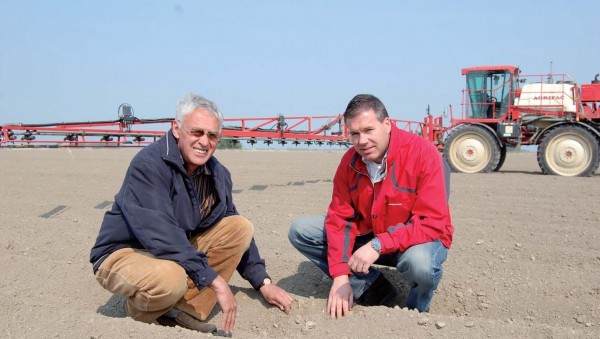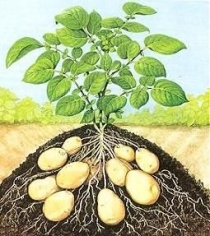
Article N-xt Fertilizers with farmer

Arable farmer Arnold van Woerkom uses fertilizers based on acids
it's not the plants, but the soil that must be fed
Arable farmer Arnold Van Woerkom is of the opinion that it's not plants, but the soil that they grow in that should be fertilized. This view brought him to N-xt Fertilizers, a company that specialises in fertilizers based on acids. “With conventional fertilizers you destroy the soil life,” explains Marco van Gurp.
Arnold van Woerkom is very much aware that his arable farm forms part of a chain. That is one of the reasons why he has joined the cooperation project De Sjalon (see the box). “Our aim is to expand to 300 hectares so we can achieve profits with this concept. A livestock farmer could also join the project; that would only increase our possibilities, also with regard to the fertilizers,” says Van Woerkom. The project’s strength lies in cooperation. “We can use each other's capacities and qualities,” says Van Woerkom.
Feeding the soil
The cooperation and the brainstorming sessions with fellow entrepreneurs have broadened Van Woerkom's understanding of the total chain. “We are only a small part of the chain, and we cannot allow ourselves to continue doing what we have always done without paying any attention to important developments in our chain. We will have to change our views,” says the farmer. He believes that the primary sector now faces problems regarding the growth and health of plants and animals, the very things with which humans ultimately feed themselves. “I once read an article by a professor who said that medical science may have succeeded in allowing humans to live to a greater age, but the number of ailments, diseases and complaints has not decreased. One of the reasons that was given for this is that the content of our foodstuffs is no longer adequate.” In around 1920 food ranges contained 70 different minerals and trace elements. By 1994 that had decreased to only 24. “According to the professor who wrote the article, this is attributable to the condition of our soil. Ever since the 1920s farmers have been encouraged to produce large volumes of foodstuffs by applying nitrogen, phosphate and potassium. “That's what we have been doing, and we are now faced with the consequences. Things simply have to change. This brought us to the theory that it's not the plants we should be feeding, but the soil. The soil is the problem,” says Van Woerkom.
N-xt
Van Woerkom realised at an early stage already that new legislation and regulations would imply restrictions for the agricultural sector. ”I am an offensive thinker, and my first thought was: ‘how can we solve that?’ If you have to reduce your mineral doses, you have to try and find ways of making your fertilization strategy more efficient.” That thought brought Van Woerkom to N-xt Fertilizers. Trials using their fertilizers had shown that the same yields can be realised with less input. “And that means greater profits, and also greater benefits for the environment.” The fact that the new strategy implied slightly higher costs at first didn't matter that much to Van Woerkom. “My main aim is to ensure my farm's continuity, and I am prepared to make any investments that may call for. Now that I have more scope to use organic fertilizers I am making higher profits. Over the years a new dimension has appeared: that of our soil.”
Activate soil life
Marco van Gurp of N-xt Fertilizers explains how his company’s fertilizers differ from standard fertilizers. “The latter are based on the use of salts. N-xt fertilizers work according to complex chemistry that is based on acids.” It involves complexing urea with acids, which leads to stable organic fertilizers. Van Gurp says you can compare the mineral composition of his company’s fertilizers with that of deep litter of the old days. “As they contain substances the soil is familiar with, the fertilizers behave naturally in the soil. The salts and chlorine in conventional fertilizers destroy soil life.” As an example of the effect of salt he mentions the use of salt to kill slugs, but also the use of salt in cooking. “Salt is then used specifically for the purpose of destroying bacterial life. And what we are doing now is scattering that same stuff on our soil, whereas bacterial life is very important,” explains Van Gurp. “The same holds for chlorine,” adds Van Woerkom. N-xt fertilizers, based on complex compounds, on the contrary activate soil life. Just consider what effect deep litter has always had, “explains Van Gurp.

Good start
Van Woerkom applies N-xt FertiVal together with Moncerene when he plants his potatoes. The fertilizer is applied in the ridges, where it will be close to the plants’ roots. N-xt Fertival is an starter fertilizer containing nitrogen and a source of bacterial spores. “Together with the many available trace elements it protects my crops from Rhizoctonia infections and is it guarantees a good start,” says Van Gurp. The bacterial spores grow along with the crops’ root system. After the crop has been planted a N-xt soil fertilizer is applied using a machine with coulters. That fertilizer contains ammonium nitrogen, phosphate, boron, sulphur and zinc. “That's the basis of my fertilization plan,” explains Van Woerkom. He then sprays his crop with N-xt Calcium before using a rotary cultivator. That contains ammonium nitrogen, calcium and boron. “The ratios of these substances are important for ensuring that the calcium can be taken up. Thanks to the technology and the formulation of N-xt Calcium I can avoid adversely affecting soil life and still have the right amount of calcium available without all kinds of negative side-effects such as acidification of the soil. That’s important for promoting tuberisation and preventing scab,” says Van Gurp. After the crop has emerged it is sprayed whenever necessary with N-xt foliar fertilizer containing amide-N and trace elements, which can be combined with agents to prevent diseases. There is then no longer any need for fertilization with CAS. Each time the crop is sprayed it can be fed with 10 kg net of amide-N.
Dosage
Van Woerkom uses his experience to calculate his basic fertilizer dose. “I think it’s important for all my crops, and not just my potatoes, to be bale to develop free of stress.” He explains that certain climate conditions can prevent the take up of fertilizers. “This causes the plants to suffer stress. When that happens you may feel inclined to apply extra fertilizers, but the question is whether that is actually necessary. The right fertilizers may be available, but perhaps they can't be taken up. If the weather changes, there's nothing more you can do. Spraying helps you give your crop what it needs at the right time. You have a tool that allows your crop to die off naturally. A crop that has died naturally is stronger and more stable than a crop that has been killed.”
After-effect
That a crop’s strength and stability have an after-effect on the next generation is something that Van Woerkom knows from experience. He once supplied seed potatoes to a grower with a shortage. When that grower harvested his crop, he found that the yield of the seed potatoes of the same variety that had been supplied later was greater than that of the other seed potatoes. Van Gurp adds: “Measurements have revealed that the energy value of crops treated with N-xt is greater than that of crops treated with conventional fertilizers.” Higher energy levels were measured not only in the crops themselves, but also in the milk of cows that were fed grass from grasslands treated with N-xt. Van Gurp attributes this to the composition of the proteins.
Close monitoring
Van Woerkom is very satisfied with this new way of fertilizing his crops. “My new fertilization strategy enables me to monitor and control my crops’ development more closely. That holds for potatoes, but also for my onion and carrot crops. On top of that my yields are higher, which implies a tremendous benefit for the environment.” Van Woerkom now no longer needs to feed his crops 150 kg of N to ensure 100 kg in his plants. “That's my trump card. It's of great use to me. Our sector must communicate developments like this to ensure the consumers’ trust in us.”








